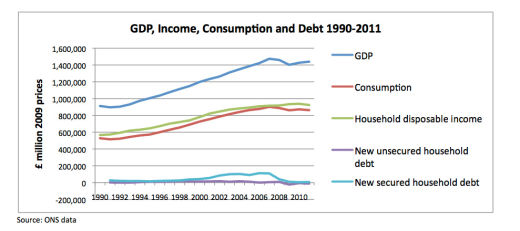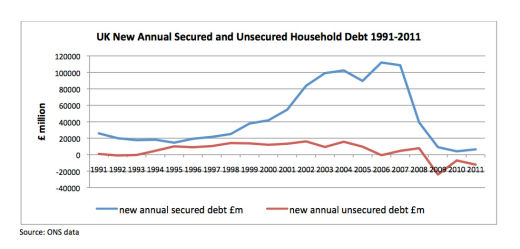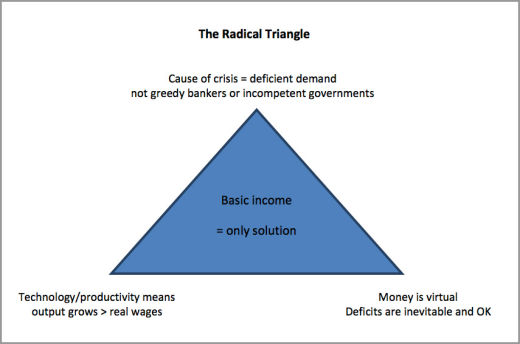Economist Geoff Crocker argues that the current economic system is based on flawed thinking and that a new system demands the use of basic income.
Author: Geoff Crocker
Geoff Crocker is an economist and advocate of a basic income. He argues here that our current economic systems are creating the current economic crisis and that the use of a basic income is part of an approach that would help put us back onto a better path.
The delinkage of productivity and real wages is the underlying cause of the 2007 economic crisis. As a result of this delinking, consumer income lagged output GDP, and the gap was funded by consumer credit and increased deficit-financed welfare payments. This proved unsustainable, and so led to current austerity policy and GDP cuts. An alternative paradigm is needed in which the financial sector is re-engineered and financial instruments redefined to serve the real economy. Deficient demand and financial deficit are inevitable in advanced technology economies. The only ultimate solution is a basic income funded by QE in proportion to output GDP and not counted as deficit.
The debt crisis persists. In the US, the Eurozone, and the UK, politicians are implementing dire austerity packages. UK debt will not now be written off in the life of this Parliament. Greece, Spain and Italy may be in the worst position, but the phenomenon deeply affects the majority of developed economies. The apparent easing of economic conditions in 2014 does not alter this fundamental underlying crisis.
How has this come about? The popular answer trotted out as the daily news mantra that governments have been reckless, bankers have been greedy, and consumers have been overspending, is too simplistic. The problem has deeper roots and causes, and will continue unabated unless these are better understood and addressed by policy.
Current talk is entirely monetarist. Economics itself is in crisis. It is reduced to some sort of meta-accountancy. Keynes is derided by people who have never read him. Leading economics media commentators often have no formal economics training or degree. Economics degrees themselves have often been restyled as ‘economics, finance and business’ degrees. The British Chancellor of the Exchequer thus tells the nation that it ‘cannot afford’ economic activity, which has to be cut because we simply ‘don’t have the money’. But the real economy is about real resources of people, skills, infrastructure, technology, land. They are all available.
Standing back for a moment, isn’t it curious that human societies allow the money they themselves create as artefact to serve the real economy, to then dictate their real economic behaviour? The tail really is wagging the dog. In the present structure, governments must raise money from the bond markets, who insist on repayment at interest rates which these markets determine according to their own level of confidence. Thus society and its governments are entirely subject to the prescriptions of bond dealers and credit rating agency speculators, who have no remit or capability in social governance. Curious again, that UK political comment on Britain’s EU membership is so troubled about ‘handing sovereignty to Brussels’, and to non-elected technocrats, but is entirely supine in handing far greater sovereignty to bond dealers and credit rating agencies. Standard and Poor’s, Moody’s, and Fitch are entirely unelected and lack any democratic accountability, and yet are allowed to sit in easy judgment on our total economies, and to determine their prospects and scope for action. We can thank Michel Barnier, the 2010-2014 EC Internal Market Commissioner, for seeking to constrain them. He deserves our support.
We need a new paradigm in which we understand money and financial agencies as servants rather than as masters of the real economy. Money is virtual, not real. It does not obey the laws of thermodynamics. It can be created or destroyed. Commercial banks do this regularly. They operate lending ratios whereby they lend a multiple of the deposits lodged with them. Market economies ‘print money’ all the time in this way as a regular practice. A sustained total run on the banks would always cause them to collapse. The system is supported only by confidence. The only rule is that the amount of money in circulation has to be matched by real output, if its value is to be maintained, and hyper-inflation avoided. Money does not have to be supported by gold, or by bond purchases, but only by output GDP. To allow monetary factors to determine policy for the real economy is like trying to drive a car by bending its speedometer needle.
So what alternative diagnostic of the ongoing debt crisis is available? A thought experiment might help. In an imaginary totally automated economy with no workers, there would be no wages, and therefore no effective monetised demand. Goods and services would therefore have to be allocated by government to consumers by some voucher or shareholder mechanism. As the late Bob Crow, the UK RMT union leader put it in his ‘Lunch with the Financial Times’ interview in March 2011, paraphrasing the 1950s US trade union leader Walter Reuther, ‘if you have robots build cars, how are robots going to buy them?’.
A more erudite version of the same concept comes from Professor Robert Solow, a distinguished emeritus professor at MIT and Nobel Economics Laureate, who points out that with burgeoning production from advanced technologies ‘the wage will absorb only a small fraction of all that output. The rest will be imputed to capital...the extreme case of this is the common scare about universal robots : labour is no longer needed at all. How will we then live? ....The ownership of capital will have to be democratised...(needing) some form of universal dividend...Not much thought has been given to this problem’ (in Revisiting Keynes by Pecchi and Piga, MIT Press 2010, p92).
In this scenario, the total voucher spend by the government would represent an unavoidable deficit which would never be paid off. We are not there, but we have strong elements of this scenario in our modern technological economies. The delinking of productivity and real wages makes deficit inevitable.
A general diagnostic for technologically advanced economies then emerges that whenever productivity exceeds real wages, and if the difference is not fed through to consumer demand via increased shareholder dividends or social transfer payments, then consumer demand will be insufficient to purchase output GDP. In this situation, which can and does occur, the shortfall in consumer demand can be made up by extended consumer credit and welfare payments, or output GDP can be cut in a recession. The diagnostic bears some resemblance to Marx’s and Keynes’s thinking on the implications for technology, automation and productivity on the economy, but should not be dismissed for this honourable association.
2007 was the root of the present crisis.
If we go back to UK economic data then, we find that between 2001 and 2007:
This is shown in the following graph:

The dramatic increase in household credit is less apparent in the scale of the above GDP diagram but is evident when graphed alone in the following diagram:

New consumer debt became essential to fund the purchase of output GDP. Without it GDP would have fallen due to decreased effective demand, and employment, wages and income would then have fallen as a consequence.
The current system faces two alternative vicious circles, either that
Neither is sustainable and leads to banks reducing consumer credit, and government cutting the real economy in the mistaken belief that this will eliminate its deficit. This is where we are now, and without a radical rethink, we will be chasing our tails for ever in the doomed attempt to write off deficits from an ever shrinking GDP. Those who call for increased UK government expenditure under a Plan B to raise GDP, which would then raise the tax take and reduce welfare payments and hence reduce the deficit, are derided by their critics who ask how it can be possible to incur debt to reduce debt. But the government’s Plan A insistence on cutting the economy to reduce the deficit has to explain how GDP can be increased by cutting GDP.
An alternative paradigm is needed to frame an alternative policy. There is nothing wrong with the real economy. Its factories, transport and communications infrastructure, skilled labour, restaurants etc are all fully operational and highly efficient. There is also plenty of real demand for goods and services, especially globally from developing country consumers. It is purely the financial system which is disabling the real economy, and it is the financial sector which therefore urgently needs re-engineering.
It is commonly said that banks lent too much credit in 2007, firstly in the US sub-prime mortgage market, and then widely in the UK economy. But the above analysis shows that bank lending was needed to purchase GDP output, a claim which is substantiated by the lack of inflation in goods and services markets both then and throughout the ‘NICE’ decade. It is true that asset prices inflated, but this resulted from any credit beyond the GDP/disposable income gap.
Productivity growth in excess of real wage growth, and the gap between consumer income and GDP output this produces, has distributive consequences. Between social groups, it tends to disfavour the poor, who rely on the wage element of income, who suffer the loss of low skilled employment when automation displaces labour, and whose access to credit as a replacement to wages is weak. Welfare payments are their only recourse. Surprisingly, the Institute of Fiscal Studies report Poverty and Inequality in the UK : 2011 shows that increased welfare payments did overcome income disadvantage. According to the IFS study, child poverty at 20% was by then the lowest since 1985, and pensioner poverty was lower than at any point in the previous 50 years.
The sectoral distribution of GDP is also affected by automation. Manufacturing employment and real wages per unit of output will fall, and much of this employment is transferred to low wage service sectors of the economy, only some of which like banking are subject to automation and productivity improvement. From anecdotal evidence, increased low productivity low wage service sector employment has absorbed employment reduction in more automated manufacturing sectors, and masked the effect of productivity in reducing aggregate real wages. Population growth is another factor masking the demand deficiency resulting from the delinkage of productivity and real wages.
We could of course take the view that reduced consumption is exactly what we want as part of a new ascetic paradigm to conserve world resources. Competition for these natural resources from China and India may well force this choice on us anyway. But if we do pursue this option, income redistribution to those newly unemployed through productivity gains unmatched by new demand, will be an essential part of the paradigm. Some form of welfare payment which does not add to government debt would have to be found.
What is needed in the new paradigm, where it is accepted that the delinkage of productivity and real wages will make an element of deficit financing inevitable, is a non-repayable financial instrument, a universal credit. This would have to be non-repayable at both consumer and government level.
Proposals for a basic income are longstanding. Clifford Douglas was an early pioneer in his 1920 ‘Economic Democracy’ and 1924 ‘Social Credit’. His basic income proposal was developed from his observation that the value of goods and services produced by industry exceeded the wages available to purchase them. Samuel Brittan, then assistant editor of the Financial Times and Steve Webb, currently UK Minister of State for Pensions, developed a detailed proposal in their 1990 Beyond the Welfare State – An Examination of Basic Incomes in a Market Economy. Samuel Brittan wrote as a neo-classical economist according to whom workers need to price themselves into work by accepting a low market clearing wage. This ignores the superior Keynesian diagnosis of the wage as effective macroeconomic demand, but Brittan did recognise the moral failure of the low market clearing wage and called for a basic income supplement. Steve Webb appeared to accept Brittan’s neo-classical analytic, and advocated a basic income to alleviate poverty, modelling several schemes in detail.
Current support for a basic income proposal comes from the Citizen’s Income Trust in the UK www.citizensincome.org and the Basic Income Earth Network, BIEN, internationally www.basicincome.org/bien.
The three main arguments advanced are:
1. Social justice - Guy Standing, Professor of Development Studies at the School of Oriental and African Studies, University of London in his 2010 The Precariat and 2014 A Precariat Charter argues that all citizens have a right to socially inherited wealth.
2. Welfare system effectiveness - Malcolm Torry, Director of the Citizen’s Income Trust, in his 2013 Money for Everyone: Why We Need a Citizen's Income, argues that a basic income is the most effective means of welfare, avoiding the high marginal deduction rates of current benefits which create the familiar unemployment and poverty traps.
3. Economic necessity - This is the argument of the current paper. It relies on a ‘radical triangle’ of three propositions shown in the following diagram that:

Such an income would not be repayable by the consumer and should be financed without incurring government deficit. This can be readily done by creating a public sector bank with a government deposit, and a lending ratio set to exactly meet the shortfall between output GDP made possible by increased productivity, and flat or declining real wages. It would be necessary to ensure that the basic income is spent and not saved, so that it had the intended effect on demand in the economy. One way to do this might be to issue credit cards with stored values which were erased at the end of the year.
If the increased consumer credit of 2007 had instead been funded in this way, the economy would not face the crisis it faces today. We have to think outside the box. Calls for a plan B in the UK are stuck within the present paradigm. This new paradigm would re-engineer the financial sector and the management of inevitable debt. It would release the real economy from artificial financial constraint, and deliver sound finances built on the same productivity advances. It would also greatly enhance social cohesion.
Geoff Crocker holds a first class honours economics degree from Durham university UK and an MA in Philosophy of Science from Bristol university UK. He has extensive work experience in industrial strategy for major international corporate clients including many years work in strategic development of Russian industry. Geoff's work is set out at www.tms.eu.com and he is also the author of Managerial Philosophy of Technology (Palgrave Macmillan 2012). Email Geoff: geoff.crocker@3wa.co.uk
The publisher is the Centre for Welfare Reform.
The Economic Necessity of Basic Income © Geoff Crocker 2014.
All Rights Reserved. No part of this paper may be reproduced in any form without permission from the publisher except for the quotation of brief passages in reviews.
Basic Income, tax and benefits, Article